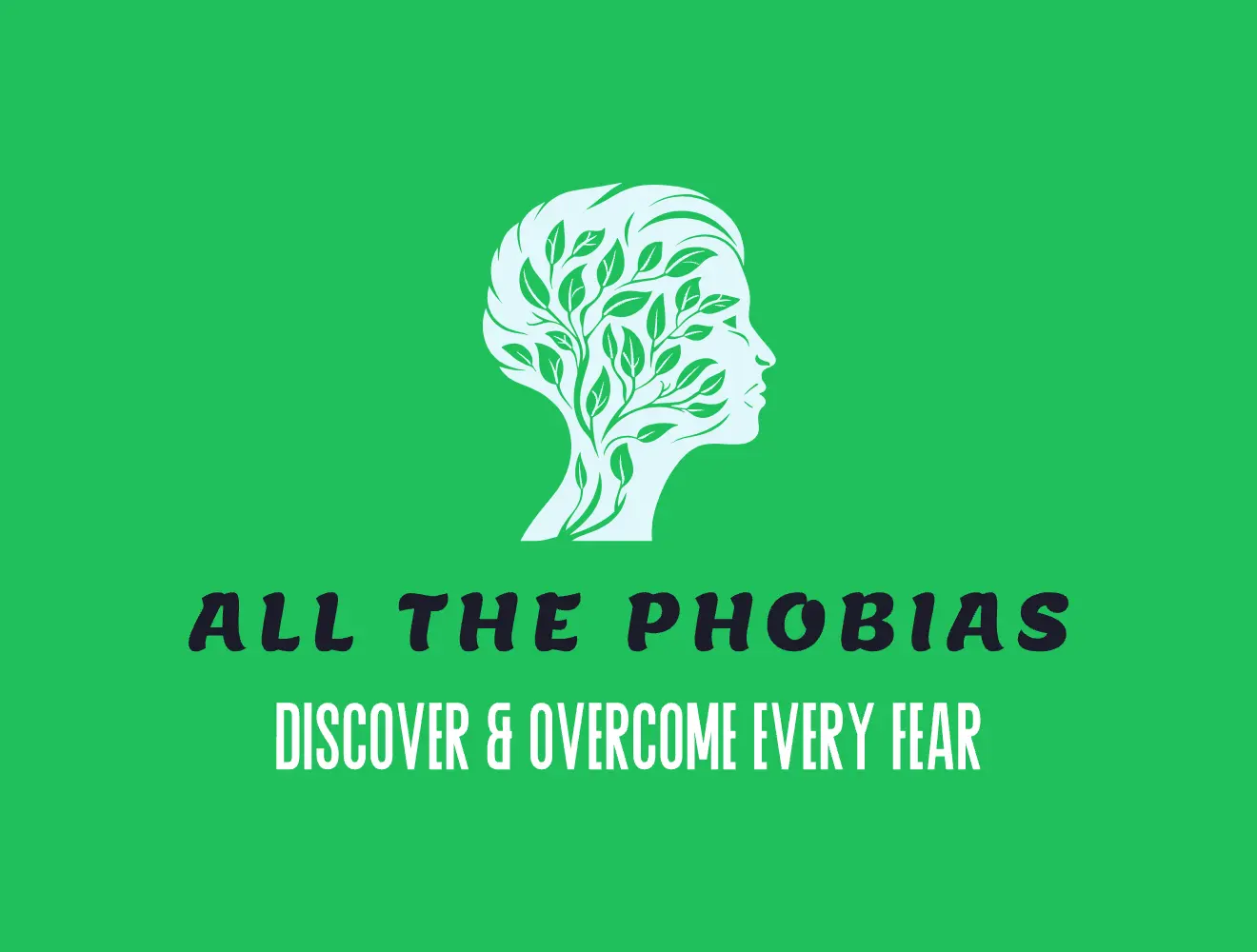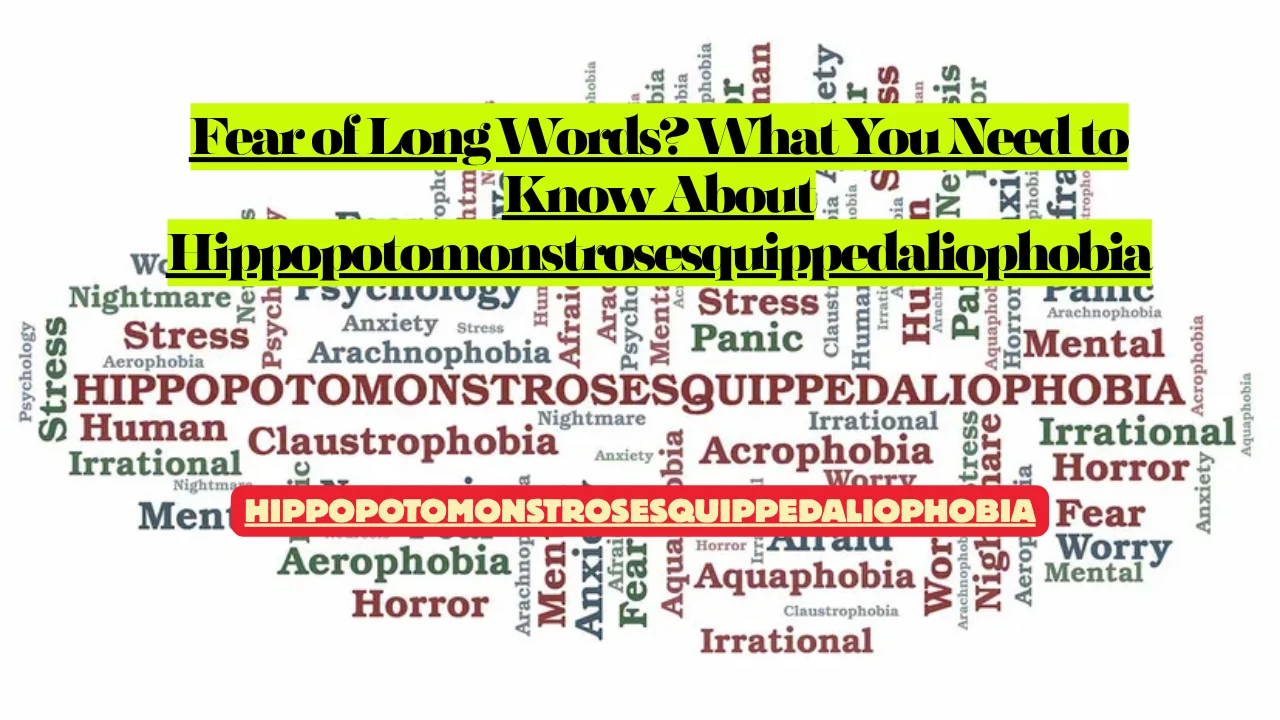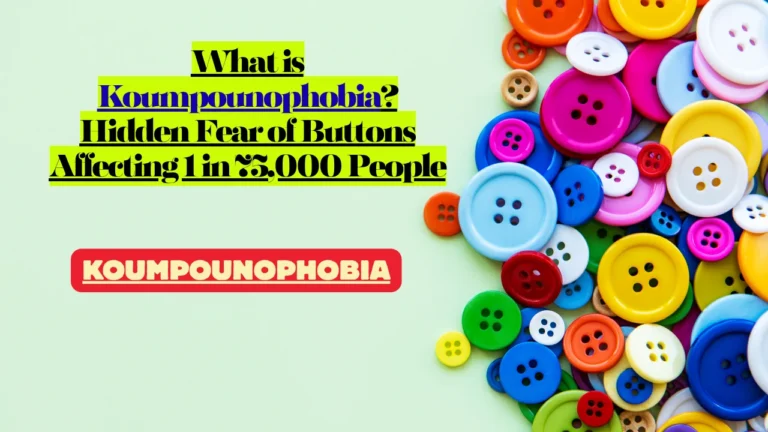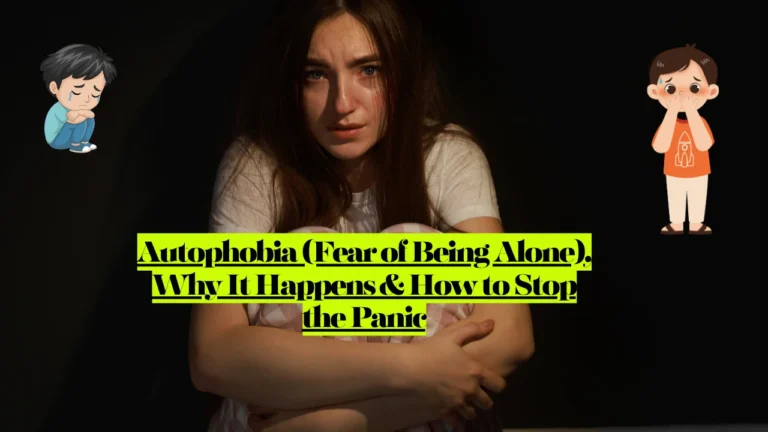Imagine your heart racing just from seeing a long word like antidisestablishmentarianism.
For most people, it’s a tongue twister but for others, it sparks genuine panic.
Hippopotomonstrosesquippedaliophobia, also known as the fear of long words, is a rare but very real anxiety disorder that can make everyday reading, studying, or speaking feel overwhelming.
If you find yourself avoiding long or complex vocabulary because it triggers anxiety, you may be experiencing this specific phobia.
Quick Facts
- Around 7.4% of people worldwide experience a specific phobia at some point in their lives.
- About 12.5% of U.S. adults will deal with one according to the National Institute of Mental Health (NIMH).
- The American Psychiatric Association doesn’t officially list Hippopotomonstrosesquippedaliophobia in the DSM-5 — but the distress it causes is absolutely real.
- Proven treatments like Cognitive Behavioral Therapy (CBT) and Exposure Therapy show success rates between 60–90% for specific phobias.
- With proper support and professional guidance, this fear can be effectively managed — and even overcome completely.
What Exactly Is Hippopotomonstrosesquippedaliophobia?
Hippopotomonstrosesquippedaliophobia is an intense, irrational fear of long or complex words.
People with this condition often experience sudden anxiety, rapid heartbeat, sweating, or panic attacks when reading, hearing, or trying to pronounce lengthy terms.
Although it’s not officially classified as a mental disorder in the Diagnostic and Statistical Manual of Mental Disorders (DSM-5), it falls under the broader category of specific phobias — fears triggered by a particular object, situation, or experience.
This fear can affect many areas of life, from education and career opportunities to social confidence and communication skills.
The good news? Like most specific phobias, phobia of long words is highly treatable with structured therapy, gradual exposure, and modern coping strategies.
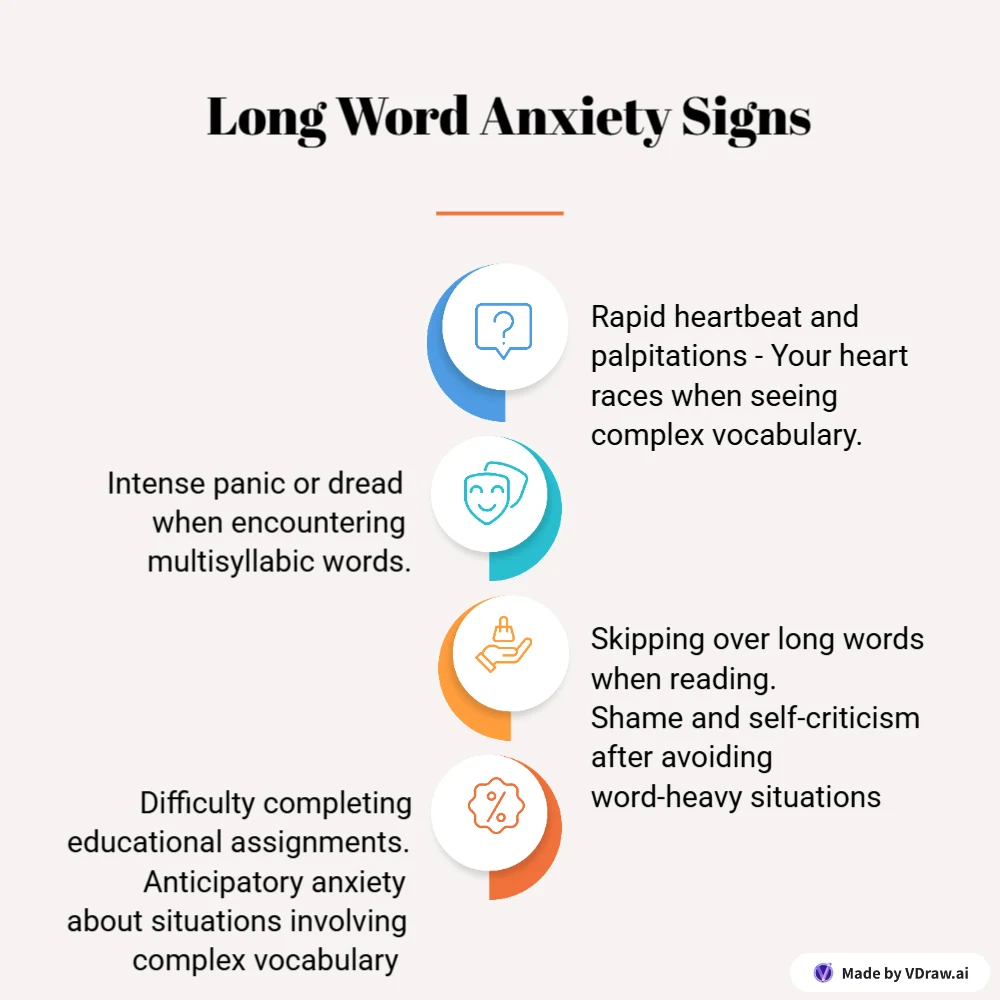
Do You Have Hippopotomonstrosesquippedaliophobia Or Long Word Anxiety? Key Signs to Look For
Physical Symptoms When Encountering Long Words:
• Rapid heartbeat and palpitations – Your heart races when seeing complex vocabulary
• Shortness of breath or hyperventilation – Breathing becomes difficult or shallow
• Sweating and trembling – Physical shaking, especially in hands and voice
• Nausea or stomach upset – Digestive discomfort when forced to read lengthy words
• Muscle tension and headaches – Physical stress responses throughout the body
• Dizziness or lightheadedness – Feeling unsteady when confronted with challenging vocabulary
Emotional & Mental Responses:
• Intense panic or dread when encountering multisyllabic words
• Overwhelming embarrassment about potential mispronunciation
• Cognitive freezing – mind goes blank when trying to process long words
• Anticipatory anxiety about situations involving complex vocabulary
• Shame and self-criticism after avoiding word-heavy situations
The severity ranges from mild discomfort with particularly long words to panic-level fear that significantly impacts daily functioning.
Related Phobia: What is Misophonia? Sound Sensitivity Disorder That’s Affecting 4.6% of Adults
Behavioral Changes:
Avoidance Patterns: • Skipping over long words when reading • Choosing simpler vocabulary in speech and writing • Avoiding academic or professional settings with complex terminology • Refusing to read aloud or participate in discussions
Daily Life Impact: • Difficulty completing educational assignments • Limitations in career choices requiring technical vocabulary • Social withdrawal from intellectually challenging conversations • Reduced reading comprehension and learning capacity
When this fear begins interfering with work, education, or relationships, it reaches clinical significance and warrants professional attention.
Understanding Fear of Long Words
What Causes Fear of Long Words?
The Science Behind It:
The fear response activates your amygdala (your brain’s alarm system), triggering the same fight-or-flight response as facing real physical danger. This neurological reaction explains why the physical symptoms feel so intense and uncontrollable.
Why Some People Develop It:
• Genetic predisposition – Family history of anxiety disorders increases risk
• Personality traits – Perfectionism and fear of judgment contribute significantly
• Learning differences – Dyslexia or processing disorders may increase vulnerability
• Cultural factors – Educational environments emphasizing verbal performance
Development Patterns:
Childhood Origins: • Embarrassing classroom experiences with reading aloud • Traumatic experiences learning spelling and pronunciation • Teacher or peer criticism regarding vocabulary mistakes • Academic pressure in language-heavy subjects
Adult-Onset Presentations: • Professional situations requiring technical terminology • Educational pursuits involving specialized vocabulary
• Social situations highlighting vocabulary differences • Medical or legal encounters with complex language
Risk Factors: • Family history of specific phobias or anxiety disorders • History of learning disabilities or language processing issues • Perfectionist personality traits • Previous traumatic experiences involving public speaking or reading • Social anxiety disorder or generalized anxiety
How It Differs From Normal Discomfort:
Everyone occasionally struggles with complex vocabulary, but hippopotomonstrosesquippedaliophobia aka phobia of long words involves: • Persistent fear lasting 6+ months that doesn’t improve with exposure • Functional impairment affecting education, career, or relationships
• Immediate anxiety response even thinking about long words • Avoidance behaviors that limit life choices and opportunities
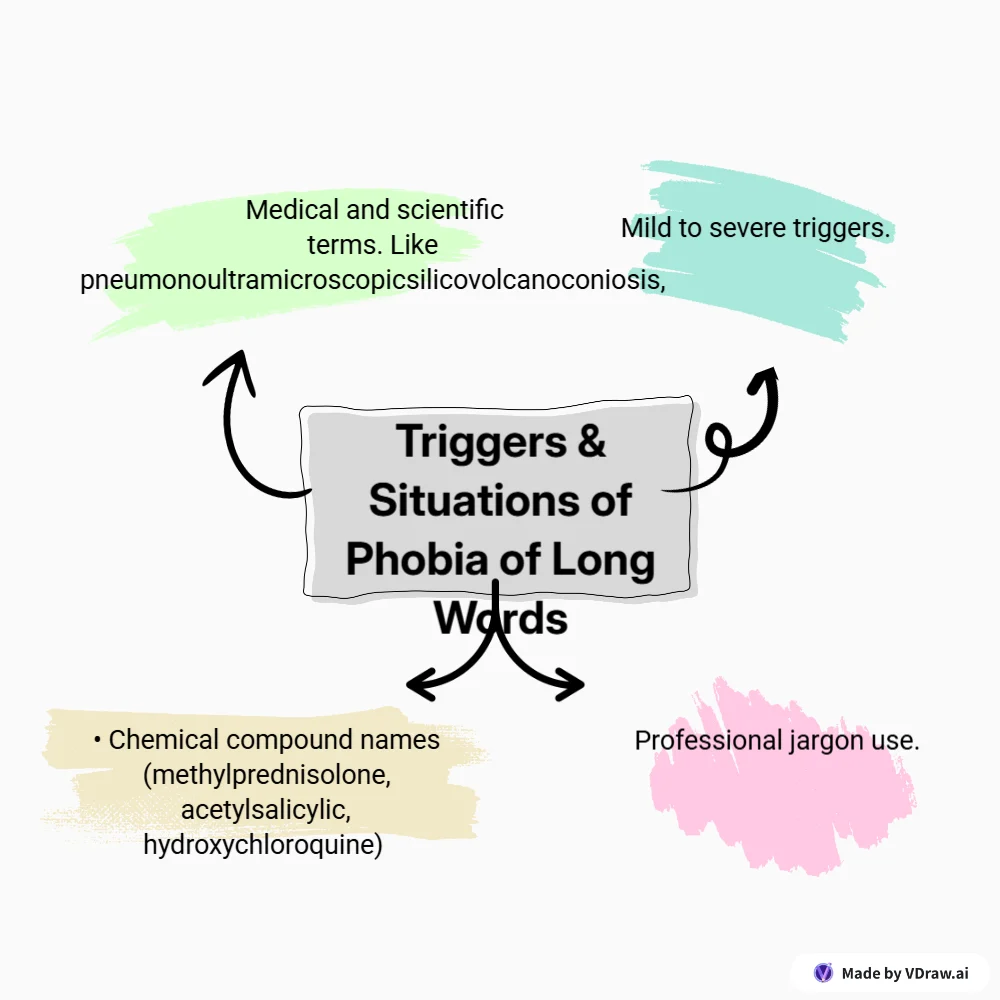
Comprehensive Triggers & Situations of Phobia of Long Words
Complete Guide to Hippopotomonstrosesquippedaliophobia Triggers
Major Word-Related Triggers:
• Medical terminology (pneumonoultramicroscopicsilicovolcanoconiosis, electroencephalography)
• Scientific vocabulary (deoxyribonucleic, phosphatidylserine, immunoelectrophoresis)
• Legal terminology (antidisestablishmentarianism, constitutionalization)
• Academic language (psychopharmacology, electrocardiogram, otorhinolaryngology)
• Foreign language borrowings (schadenfreude, onomatopoeia, serendipitous)
• Chemical compound names (methylprednisolone, acetylsalicylic, hydroxychloroquine)
• Geographic locations (Llanfairpwllgwyngyllgogerychwyrndrobwllllantysiliogogogoch)
• Technical jargon specific to various professions
Severity Levels:
• Mild triggers – 4-6 syllable words causing slight discomfort
• Moderate triggers – 7-12 syllable words creating noticeable anxiety
• Severe triggers – 13+ syllable words causing panic responses
Modern Digital Triggers:
• Social media posts with complex vocabulary
• Online articles requiring advanced reading levels
• Educational videos with technical terminology
• Work emails containing industry jargon
• Academic research papers and professional publications
Workplace & Educational Settings:
• Professional presentations requiring technical terms
• Academic lectures in specialized subjects
• Medical appointments with complex diagnoses
• Legal consultations involving contractual language
• Technical training programs with industry-specific vocabulary
• International business communications
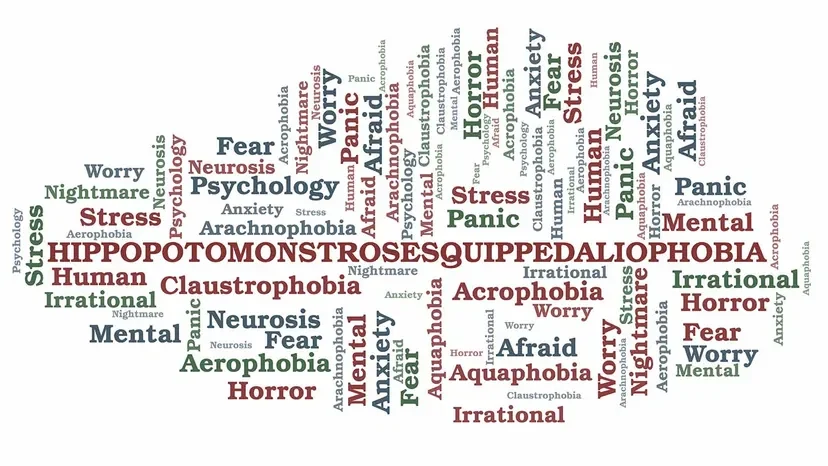
Real-World Impact & Life Challenges
How This Fear Affects Daily Life
Sarah, a marketing professional, discovered her hippopotomonstrosesquippedaliophobia was limiting her career advancement when she consistently avoided presentations containing industry terminology. After working with a therapist specializing in anxiety disorders, she developed coping strategies that allowed her to participate confidently in professional discussions while managing her fear.
Common Life Areas Affected:
Work/Career Implications: • Avoiding roles requiring technical communication • Difficulty participating in professional development • Limited advancement opportunities in specialized fields • Reduced confidence in client presentations and meetings • Struggling with industry-specific documentation
Educational Challenges:
• Avoiding advanced courses with complex vocabulary • Difficulty succeeding in science, medical, or legal studies • Reduced participation in classroom discussions • Academic underachievement despite intellectual capability • Limited educational and career pathway choices
Social & Personal Impact: • Avoiding intellectual conversations and debates • Reduced reading for pleasure, limiting personal growth • Embarrassment in social situations requiring articulate communication • Impact on self-esteem and perceived intelligence • Relationship difficulties when partners don’t understand the fear
Decision-Making Limitations: • Choosing simpler alternatives even when complex options are better • Avoiding challenging personal growth opportunities • Making life decisions based on fear rather than genuine preferences
Treatment & Recovery Options
Proven Ways to Overcome Fear of Long Words
Professional Treatment (Most Effective):
Cognitive Behavioral Therapy (CBT): Research shows CBT is effective for specific phobias with success rates of 60-80% according to multiple clinical studies. CBT for this phobia involves: • Thought challenging – Identifying and correcting catastrophic thinking about long words • Behavioral experiments – Gradually testing feared predictions in safe environments
• Coping skills training – Learning relaxation and grounding techniques • Typical duration: 12-20 sessions with significant improvement often seen within 8-12 weeks
Exposure Therapy: Studies consistently show exposure therapy has 60-90% effectiveness rates for specific phobias (Journal of Clinical Psychology, 2023). The process involves: • Systematic desensitization – Gradual exposure to increasingly complex words • Controlled exposure sessions – Starting with mildly challenging vocabulary
• Real-world practice – Eventually reading complex texts and using technical terminology • Success approach: Most people experience significant improvement within 10-15 sessions
Other Professional Options: • EMDR (Eye Movement Desensitization and Reprocessing) – Particularly helpful if trauma-related origins • Acceptance and Commitment Therapy (ACT) – Focuses on accepting anxiety while pursuing valued goals • Group therapy – Provides peer support and normalized experiences
When to Seek Professional Help: • Fear persists longer than 6 months • Avoidance behaviors limit educational or career opportunities • Physical symptoms (panic attacks, persistent anxiety) occur regularly
• Fear significantly impacts relationships or social functioning • You’re considering major life decisions to avoid triggering situations
Self-Help Strategies:
Daily Management Tools: • Progressive vocabulary exposure – Start with slightly challenging words and gradually increase complexity • Mindfulness meditation – 10-15 minutes daily to reduce overall anxiety sensitivity • Relaxation techniques – Deep breathing and progressive muscle relaxation • Positive self-talk – Challenging self-critical thoughts about intelligence or capability
Building Confidence: • Practice pronunciation using online dictionaries with audio • Join supportive online communities focused on vocabulary building • Use vocabulary apps that gamify learning complex words • Read diverse materials at gradually increasing difficulty levels
Ready to take the first step? Consider downloading our free Phobia Recovery Toolkit or connecting with qualified therapists specializing in anxiety disorders through our professional directory.
Immediate Coping Strategies & Resources
What You Can Do Right Now
Emergency Coping Techniques:
4-7-8 Breathing Technique:
- Inhale through nose for 4 counts
- Hold breath for 7 counts
- Exhale through mouth for 8 counts
- Repeat 4-6 times until calmer
5-4-3-2-1 Grounding Method: • 5 things you can see • 4 things you can touch
• 3 things you can hear • 2 things you can smell • 1 thing you can taste
Progressive Muscle Relaxation: • Tense and release muscle groups starting with toes • Hold tension for 5 seconds, then relax for 10 seconds • Work systematically up to head and neck • Focus on the contrast between tension and relaxation
Safe Space Visualization: • Close your eyes and imagine a peaceful, word-free environment • Engage all senses – what do you see, hear, feel, smell? • Stay in this space for 2-3 minutes • Return to this visualization when encountering triggers
Helpful Resources:
Crisis Support: • National Suicide Prevention Lifeline: 988 • Crisis Text Line: Text HOME to 741741 • Anxiety and Depression Association of America Helpline: 1-240-485-1001
Educational Materials: • “The Anxiety and Worry Workbook” by David A. Clark • “Mind Over Mood” by Dennis Greenberger and Christine Padesky • Anxiety management apps: Headspace, Calm, Insight Timer
Professional Support: • Psychology Today therapist directory: psychologytoday.com • Anxiety and Depression Association of America: adaa.org • International Association for Cognitive Psychotherapy: iacp.asu.edu
Support & Next Steps
Your Path Forward
Finding Professional Help:
Types of Specialists to Look For: • Licensed psychologists specializing in anxiety disorders • Certified cognitive-behavioral therapists
• Mental health professionals with specific phobia treatment experience • Therapists familiar with exposure and response prevention techniques
Questions to Ask Potential Therapists: • “What experience do you have treating specific phobias?” • “Do you use exposure therapy techniques?” • “What is your typical treatment timeline for phobia recovery?” • “Can you accommodate my specific triggers during treatment?”
Insurance Considerations: • Most insurance plans cover anxiety disorder treatment • Verify in-network providers before scheduling • Ask about session limits and pre-authorization requirements • Consider employee assistance programs (EAPs) for initial consultations
Building Your Support System:
How Family and Friends Can Help: • Learn about your specific triggers and respect them • Offer encouragement without minimizing your experience • Support gradual exposure goals without pressure • Celebrate small victories in facing fears
What NOT to Do: • Force exposure to triggering words without professional guidance • Dismiss the fear as “just being dramatic” • Make jokes about the irony of the phobia’s name • Push for immediate “getting over it” without proper treatment
Remember: Recovery from specific phobias has excellent success rates with appropriate treatment. Seeking help demonstrates strength and self-awareness, not weakness. The AllThePhobias.com community understands your experience and supports your journey toward greater freedom from fear.
Common Questions About Hippopotomonstrosesquippedaliophobia aka Phobia of Long Words
Is Hippopotomonstrosesquippedaliophobia a real mental health condition?
While the American Psychiatric Association doesn’t officially recognize this specific phobia, the fear and functional impairment are genuine psychological experiences that can be effectively treated using evidence-based approaches for specific phobias.
How common is fear of long words?
Specific phobias collectively affect approximately 7-9% of the general population, though this particular phobia is considered rare due to its very specific nature.
Can Hippopotomonstrosesquippedaliophobia be cured?
Yes, with appropriate treatment, most people experience significant improvement. Exposure-based therapies are considered the most robust treatment and typically show excellent success rates for specific phobias.
How long does treatment take?
Most people see significant improvement within 8-15 therapy sessions using CBT or exposure therapy, though individual timelines vary based on severity and personal factors.
Can children have Hippopotomonstrosesquippedaliophobia?
Yes, children can develop this fear, often related to academic pressure or embarrassing classroom experiences. Early intervention typically leads to better outcomes.
Will I pass this fear to my children?
While there may be genetic predisposition to anxiety, phobias aren’t directly inherited. Creating supportive, non-pressured learning environments helps prevent development of word-related fears.
Can long word anxiety get worse over time?
Without treatment, avoidance behaviors can strengthen the fear response and expand to more situations. However, with proper intervention, the fear typically decreases significantly.
What should I do if I have a panic attack when encountering long words?
Use grounding techniques (5-4-3-2-1 method), practice deep breathing, remind yourself you’re safe, and remove yourself from the triggering situation if possible. If panic attacks occur frequently, seek professional evaluation.
Why is the word for this phobia so long?
The term’s length is almost certainly intentional irony on the part of whoever coined it, though this creates additional distress for those experiencing the actual fear.
Are there shorter alternative names for this condition?
Yes, “sesquipedalophobia” is a shorter alternative term meaning the same thing, though both refer to the fear of long words.
Ready to overcome your fear of long words? Find qualified therapists specializing in specific phobias in our professional directory, or take our free phobia assessment to understand your symptoms better.
Citations and References
- Wardenaar, K. J., et al. (2017). The cross-national epidemiology of specific phobia in the World Mental Health Surveys. Psychological Medicine, 47(10), 1744-1760.
- National Institute of Mental Health. (2024). Specific Phobia Statistics. Retrieved from https://www.nimh.nih.gov/health/statistics/specific-phobia
- Anxiety and Depression Association of America. (2024). Facts & Statistics. Retrieved from https://adaa.org/understanding-anxiety/facts-statistics
- American Psychiatric Association. (2013). Diagnostic and Statistical Manual of Mental Disorders (5th ed.). Arlington, VA: American Psychiatric Publishing.
- Healthline Medical Team. (2023). Hippopotomonstrosesquippedaliophobia: What Is It? Retrieved from https://www.healthline.com/health/hippopotomonstrosesquippedaliophobia
- Stinson, F. S., et al. (2007). The epidemiology of DSM-IV specific phobia in the USA: results from the National Epidemiologic Survey on Alcohol and Related Conditions. Psychological Medicine, 37(7), 1047-1059.
- Eaton, W. W., et al. (2018). Specific phobias. The Lancet Psychiatry, 5(8), 678-686.
Emergency Resources:
- National Suicide Prevention Lifeline: 988
- Crisis Text Line: Text HOME to 741741
- SAMHSA National Helpline: 1-800-662-HELP (4357)
Professional Support:
- American Psychological Association: apa.org
- Anxiety and Depression Association of America: adaa.org
- International Association of Cognitive Psychotherapy: the-iacp.com
If you’re ready to take the first step toward overcoming your fear of long words, consider reaching out to a mental health professional who specializes in anxiety disorders. Remember, you don’t have to face this alone – effective help is available, and recovery is absolutely possible.
Need immediate support? Contact the Crisis Text Line by texting HOME to 741741, or call the National Suicide Prevention Lifeline at 988 if you’re experiencing severe distress.
This information is provided by AllThePhobias.com as educational content and should not replace professional medical advice. Always consult with a qualified mental health professional for personalized treatment recommendations.
Last Updated: October, 2025
